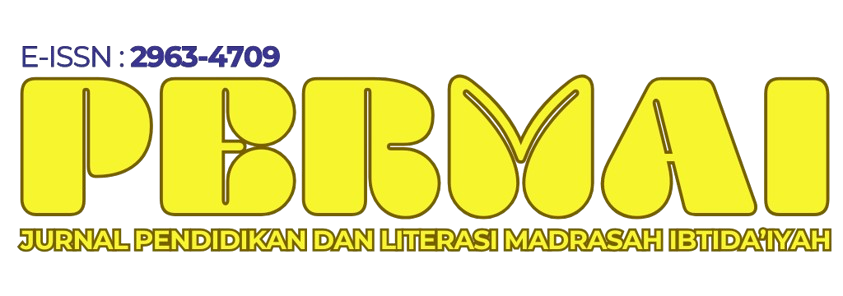PEMIKIRAN K.H. HASYIM ASY'ARI TENTANG PENDIDIKAN ISLAM DAN RELEVANSINYA DALAM PENDIDIKAN ISLAM KONTEMPORER
DOI:
https://doi.org/10.63889/permai.v1i2.127Abstract
This study aims to find out K.H Hasyim Asy'ari's thoughts about Islamic education, and whether they are still relevant in Islamic education in contemporary times. Education is also like health, including basic needs that must be fulfilled in every human being. Education is a cultural process that elevates human dignity throughout life. Education plays a decisive role in human existence and development. Therefore, it is necessary to have motivation in efforts to explore potential, direction (orientation) and good planning in the development of contemporary education. The method used in this research is qualitative research using a type of bibliography research or often interpreted as Library Research. This research analyzes content or what is often called content analysis. This content analysis is used to compare one research with other research in accordance with this article. The results of the discussion K.H. Hasyim Asy'ari did not explicitly explain the concept of his educational goals. However, it can be implicitly read from some of his statements. K.H.'s ideal goal Hasyim Asy'ari is to form a highly ethical society (akhlaq al karimah). The purpose of education is, First, to form a perfect human being who aims to get closer to Allah SWT, Second is to form a perfect human being who gets the happiness of the world and the hereafter.
Keywords: Biography of KH Hasyim Asy'ari, Islamic Education, Contemporary
References
A. Mukti Ali, 1991, Metode Memahami Agama Islam, Jakarta: Bulan Bintan.
Abdul Muchith Muzadi, 2003. Apa dan Bagaimana Nahdlatul Ulama, Jember: PCNU Jember.
Achmad Muhibbin Zuhri, 2010. Pemikiran KH. M Hasyim Asy'ari Tentang Ahlu Sunnah Wa Al-Jama'ah, Surabaya.
Http://habibah-kolis.blogspot.com/2008/01/hasyim-asyari.html
Husen Haikal, "Beberapa Metode Dan Kemungkinan Penerapannya Di Pondok Pesantren" dalam M. Dawam Rahardjo, 1985, Pergulatan Dunia Pesantren: Membangun Dari Bawah. Jakarta: P3M, cet. ke-2.
Imam Bahawani, Segi-segi pendidkan islam .Surabaya: Al-Ikhlas, 1987
Lathiful Khuluq, 2000. Fajar Kebangunan Ulama. Biografi K.H. K.H. Hasyim Asy'ari, Yogyakarta: LKis.
Mastuki HS, 2003. Intelektual Pesantren; potret tokoh dan cakrawala pemikiran di era perkembangan pesantren. Jakarta: Diva Pustaka.
Muhaimin, 1991. Konsep Pendidikan Islam. Solo: Ramadlan.
Nurjanah, R., & Efendi, A. (2019). Literary Learning for Teenager Inmates in Institute for Children Special Rehabilitation. Jurnal Cakrawala Pendidikan, 38(3), 411–425. https://doi.org/10.21831/cp.v38i3.27322
Ozilgen, Z. S. (2019). Cooking as a Chemical Reaction Culinary Science with Experimen. Francis: CRC Press, Taylor & Francis Group.
Rohinah M noor, 2010. KH. Hasyim Asy'ari Memordenisasi NU dan Pendidikan Islam, Jakarta: Grafindo Khazanah ilmu.
Simangunsong, E. (2019). Factors determining the quality management of higher education: A case study at a business school in Indonesia. Cakrawala Pendidikan, 38(2), 215–227. https://doi.org/10.21831/cp.v38i2.19685
Suwendi, 2004. Sejarah dan Pemikiran Pendidikan Islam, Jakarta: RadjaGrafindo Persada, cet. ke-1.
Suwendi, 2004. Sejarah Dan Pemikiran Pendidikan Islam, (Jakarta: Raja Grafindo Persada.
Toto Suharto, 2006, Filsafat Pendidikan Islam, Jogjakarta: Ar-Ruzz, cet. ke-1.
Wena, M. (2018). Strategi Pembelajaran Inovatif Kontemporer: Suatu Tinjauan Konseptual Operasional. Jakarta: PT. Bumi Aksara.



.jpg)

